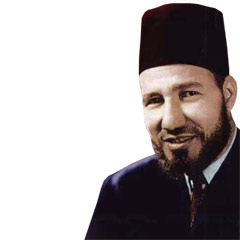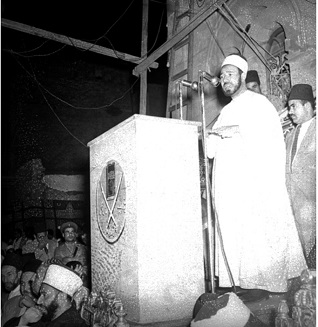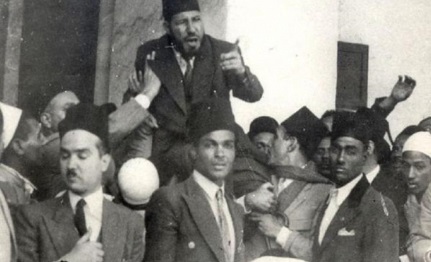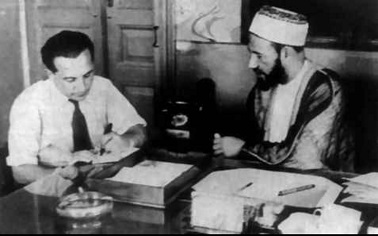.jpg)
HASSAN AL-BANNA: A MURSHID OR AN ACTIVIST?
The Society of Muslim Brotherhood (Jamaat al-Ikhwan al-Muslimin) was founded in 1928 in the city of Ismailia, Egypt. Its founder was Hassan al-Banna (1906-1949), the son of a knowledgeable watchmaker.
The misery of the workers employed by the Suez Company led al-Banna to be attracted to the socialist ideas that were popular at that time. At the same time, he was also influenced by the reformist ideas of Abduh and Rashid Rida.
The society, named after the magazine "al-Ikhwan al-Muslimin" published by al-Banna, moved to Cairo in 1932. Al-Banna, who assumed the title of "Murshid" (spiritual guide), gained fame by writing advisory letters to King Fuad I of Egypt and Muslim administrators, urging the strict adherence to Islamic principles in political and social life.

Legitimately Illegal
In Egypt, the British allowed for a multi-party parliamentary monarchy, but they were careful to maintain a balance between the political parties and the palace. The Muslim Brotherhood participated in the 1941 elections, which were won by the secular Egyptian Wafd Party. Although they did not secure seats in the parliament, their fame and influence continued to grow.
The Muslim Brotherhood pursued both legitimate and illegal methods of struggle. As a result, it was dissolved in 1944, and its assets were confiscated. Al-Banna and his associates were arrested and held responsible for the assassination of former Prime Minister Ahmed Maher Pasha. However, they were released due to insufficient evidence. In response to the closure of the Brotherhood, al-Banna harshly accused the Palace of being a "puppet of imperialism."
Wait and See
In the same year, a member of the Muslim Brotherhood named Abdulmajid Ahmed Hasan assassinated the pro-British Prime Minister Mahmud Fahmi al-Nuqrashi. Twenty days later, Hassan al-Banna was also assassinated as he was leaving the headquarters of the Muslim Youth Society (Jamiat al-Shubban al-Muslimin). The Brotherhood held the Palace responsible for these assassinations, considering them as retaliation. This is because al-Banna had been interrogated there when the Brotherhood was dissolved.
Indeed, the "divide and rule" policy pursued by the British was at play. Farouk I of Egypt was not a powerful ruler, but he also did not harm Muslims. The strings were already in the hands of the British. The British occupation administration aimed to create chaos in Egypt by pitting the ruler against radical Muslims, thus perpetuating its influence.

From Theory to Practice
After the assassination of al-Banna, the Muslim Brotherhood split into two factions: the moderate and the radical. Al-Banna 's son-in-law, Said Ramadan (not Buti), represented the moderate wing, while Sayyid Qutb, who joined the movement in 1951, represented the radical faction.
Al-Banna emerged as a leader who brought the modernist movement, initiated by Jamal al-Din al-Afghani, into active engagement. While advocating for the strengthening of religious life in the country, he unintentionally contributed to the division among Muslims in Egypt, despite there being no sectarian or racial conflicts. This sowed the seeds for the difficulties that would be experienced in later years. His mission has served as a model for many, including the Gülen movement in Turkey.
Hassan al-Banna was not a scholar, and his books were not academic works. He gathered a significant number of followers due to his ability to express his ideas in a gentle manner, to the extent that many people did not even realize he was a modernist.

Unforgivable Mistake
In 1950, the Muslim Brotherhood was permitted to resume its activities, and it formed an alliance with the socialist Free Officers Movement, a group established within the military with the aim of overthrowing the Palace. King Farouk was overthrown in 1952. However, the leader of the Free Officers, Gamal Abdel Nasser, did not fulfill his promises to the Brotherhood. As a result, the Muslim Brotherhood mobilized the public and led them to take to the streets in 1954.
"Whoever helps an oppressor, Allah will subject him to him" (Al-Ajluni) - According to this hadith, Nasser arrested and subjected around 10,000 members of the Brotherhood to accusations of assassination and torture, resulting in the death of some. It was an unforgivable mistake of the inexperienced and lacking political acumen Muslim Brotherhood to contribute to bringing the socialist oppressors to power, thereby causing harm to Muslims.
Al-Banna's grandson Tariq Ramadan, who currently resides in Switzerland, is a prominent figure in modernism and holds a professorship at Oxford. He has also been appointed as a member of the UK Foreign Office Advisory Group on Freedom of Religion or Belief in the British Parliament. Recently, his name has been involved in a sexual assault scandal.
Sheikh-Murid
Hassan al-Banna , in his youth, joined the discipleship of Sheikh Abd al-Wahhab al-Hisafi, a follower of the Shadhili order (in 1949), and became an enthusiastic disciple. He even served in the institution established under the name of Jamiyya al-Hisafiyya al-Khayriyya. However, probably due to the influence of his collaboration with modernists, he gradually became disenchanted with Sufism.
He explains this, as modernists often do, by the deviation of Sufism from its genuine essence. In his memoirs, he states, "Our relationship with our sheikh was good until the formation of the Muslim Brotherhood. We had differences of opinion regarding the Brotherhood, and everyone acted according to their own beliefs." By saying this, he also expresses his thoughts on his allegiance to his sheikh. Those who are unaware of this may still consider him a sincere practitioner of Sufism.
In an article he wrote while still in school, he does not deny Sufism, but describes it as a path that prevents the heart from being preoccupied with the affairs of creatures, and suggests that propagation and guidance should be preferred over it.

Anonymous Letters
While actively engaging in politics, al-Banna was also in contact with certain officers in the Egyptian army. He believed that Palestine could only achieve its freedom through war. For this reason, he sent armed young men from Egypt to the region. These young men collaborated with Izz ad-Din al-Qassam. Al-Banna interpreted the principle of "There is no obedience to a creature if it involves disobedience to the Creator" as a justification for rebelling against the government, contrary to the principles of Ahl al-Sunnah.
Hassan al-Banna had an activist character. In his youth, he would form secret societies with his friends and would anonymously send cautionary letters to individuals whom they believed were acting against religion. Later on, he transformed this approach into a more explicit and organized form of propaganda, which he called "da'wah."
Due to his profession as a teacher, Hassan al-Banna was aware that he could only achieve his desired system with an educated generation. Therefore, he placed great importance on educating individuals. He personally opened mosques and schools where members of the Muslim Brotherhood could carry out their activities. He traveled, delivered speeches, and published magazines to spread his ideas. He opened schools specifically for girls and established an organization called "Muslim Sisterhood" for women. He also trained young people in armed exercises and developed militia forces by providing them with military training in camps.
Additionally, Hassan al-Banna also engaged in activities related to industry, trade, and the press in order to acquire economic power. He established companies in these fields. He systematized the process of collecting donations from the public, for example, by issuing donation stamps worth 1 piastre.
Charisma
While in Cairo, al-Banna's attempt to have the Eid prayers performed collectively in a public place, outside of mosques, and with the participation of women caused a great controversy. His statement during a conference suggesting that the Night Journey and Ascension (Isra and Mi'raj) occurred through the invasion of the Prophet's soul into his body also elicited strong reactions. According to Islam, in the Isra part of the journey, the prophet Muhammad traveled on the back of Buraq (a heavenly equine) to the Al-Aqsa Mosque. In the next part of the journey, the Miʿraj, he ascended into heaven, where he individually greeted the prophets and later spoke to Allah. All of these happened in a single night, both physically and spiritually.
According to Sunni Islam, there are only four madhabs (schools of Islamic jurisprudence): Hanafi, Maliki, Shafi'i, and Hanbali. These four schools recognize the validity of each other and have engaged in legal debates over the centuries. He was accused of being among the "beneficiaries who call people to a fifth madhhab, collect and use funds from people through false means". It was alleged that despite financial regulations prohibiting officials from collecting money, he collected funds from the public for mosques and schools, and that he used these funds at his own discretion for the benefit of his close associates. Despite these complaints, he remained steadfast in his beliefs and did not deviate from the path he thought was right.
Throughout his youth, al-Banna claimed to lead a pious life in accordance with the Sunnah. He never neglected to observe the practice of seclusion (itikaf) during the last ten days of Ramadan. He was known for his outspoken nature, as demonstrated when he rejected the tea offered in silver-coated cups by an Egyptian mufti during a visit and instead requested tea in a regular cup. This frankness contributed to his charismatic presence among the masses.
Praise of Wahhabism
In the early days, Hasan al-Banna had the habit of reading traditional books such as "Ihya Ulum al-Din," "Anwar Muhammadiyyah," and "Tanwir al-Qulub." However, when he arrived in Cairo for his studies, he started attending the gatherings of Rashid Rida and the influential modernist center known as al-Maktaba al-Salafiyya. This experience led to a shift in his worldview. He even published Rashid Rida's magazine called "al-Manar" until 1940.
Hassan al-Banna, in terms of the spiritual development of the country, based his principles on the guidelines set by Jamal al-Din al-Afghani and Muhammad Abduh. He claimed that these principles led the people towards religious and moral benefits and provided a correct foundation for beliefs. (Memoirs of Hasan al Banna Shaheed, 268, 273)
He was a supporter of the Sunni-Shia rapprochement movement. He participated in the activities of the society named "Dar al-Taqrib Bayna al-Madhahib al-Islamiyya (Egyptian Center for Rapprochement of Islamic Sects)," established by modernist scholars from Egypt, Iran, Iraq, and Lebanon in Cairo in 1945, and worked towards the unity of Sunni and Shia Islam.
Hassan al-Banna, although a modernist, never explicitly talked about reform; he did not delve into controversial issues. He tried to cover up the strident views of his mentors with his own personality. In contrast to them, he sought to involve not only intellectuals but also the general public in his cause. He characterized his mission with elements that seemed contradictory, both in the Salafi movement and in the path of Sunni Islam and Sufism.
In 1928, he attempted to go to Saudi Arabia as a teacher but was unsuccessful. Disregarding the fact that institutions belonging to Sunni Islam were being eradicated and the destruction of the Prophet's memories, he praised Saudi Arabia, where Wahhabism was the official ideology, as "a developing state that emerged as a hope for Islam and Muslims, aiming to follow the book of Allah and the tradition of the Prophet and to revive the way of the righteous predecessors." (Memoirs of Hasan al Banna Shaheed, 144)
Advocacy for Democracy
Al-Banna, regarding Islamic jurisprudence, states, "Islam only lays down the fundamental principles. It addresses matters in a general sense. It leaves the remaining details of the issues to time and place. It does not dwell too much on the intricacies of the issues. Secondary rulings can be changed through ijtihad based on time and place," using examples commonly used by historical scholars. (Majmu'at Rasa'il, 298)
While acknowledging the right to property, he also defends socialist principles such as taking more from the wealthy and distributing it to the poor and nationalizing foreign companies. By claiming to prohibit usury, he says, "It is a disgrace for us as Muslims that Communist Russia implemented an Islamic system before us." (Majmu'at Rasa'il, 339, 344)
Hassan al-Banna states that there is no contradiction between Islam's administrative system and the parliamentary system, and that the Egyptian constitution does not contradict Islamic principles. (Majmu'at Rasa'il, 316) He differs from Sayyid Qutb in his advocacy for democracy. However, he advocates for the abolition of political parties and proposes the restoration of the caliphate and the unity of Muslims as goals.
Önceki Yazılar
-
FRIENDS OF ENGLAND ASSOCIATON24.04.2024
-
THE ASIA MINOR CATASTROPHE OF GREEKS17.04.2024
-
HOW DID WOMEN VEIL, AND THEN HOW WERE THEY UNVEILED…10.04.2024
-
HOW CAN HISTORY BE BELIEVED?3.04.2024
-
THE OFFICIAL MADHHAB OF THE OTTOMAN EMPIRE27.03.2024
-
WHO ORDERED THE PLUNDER OF ISTANBUL?20.03.2024
-
THE PLAYS BANNED BY SULTAN ABDULHAMID IN EUROPE13.03.2024
-
WHAT WAS THE MISTAKE OF THE UMAYYADS?6.03.2024
-
UNRAVELING THE UMAYYAD PERIOD: TRIUMPHS, TRAGEDIES, AND TRUTHS28.02.2024
-
OTTOMAN PENAL CODE AND HOMOSEXUALITY21.02.2024